Ralph VAUGHAN WILLIAMS (1872-1958) on the ALBION label - A triumphant
contribution
Albionrecords.org
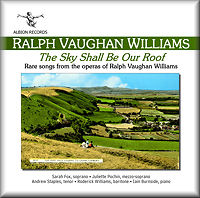 Ralph
VAUGHAN WILLIAMS (1872-1958)
Ralph
VAUGHAN WILLIAMS (1872-1958)
The Sky Shall Be Our Roof - Rare songs from the operas of Ralph
Vaughan Williams
Ten Songs (Cold Blows the Wind on Cotsall (Showman); Life must
be full of care (Aunt Jane); Sweet little linnet (Hugh); Hugh's
Song of the Road; Ah! Love I've found you (Duet for Hugh and
Mary); The Devil and Bonyparty (Showman); Alone and Friendless
(Hugh); Gaily I go to die (Hugh); Here on my throne (Mary);
Hugh my lover (Duet for Hugh and Mary) from Hugh The Drover
(1924)
Two Songs (Greensleeves; See the Chariot at hand) from Sir
John in Love (1929)
Seven Songs (Watchful's Song (Nocturne); The Song of the Pilgrims;
The Pilgrim's Psalm; The Song of the Leaves of Life and the
Water of Life; The Song of Vanity Fair; The Woodcutter's Song;
The Bird's Song) from The Pilgrim's Progress (1951-2)
 Sarah
Fox (soprano); Juliette Pochin (mezzo); Andrew Staples (tenor);
Roderick Williams (baritone); Iain Burnside (piano)
Sarah
Fox (soprano); Juliette Pochin (mezzo); Andrew Staples (tenor);
Roderick Williams (baritone); Iain Burnside (piano)
rec. Potton Hall, Westleton, Suffolk, 18-20 March 2007, 2-3
May 2007; Henry Wood Hall, 11 May 2007. DDD
 ALBION
ALB001 [60:00]
ALBION
ALB001 [60:00] 
AmazonUK
AmazonUS
I have always admired the RVW Society. This has been pretty
much on the strength of their very professionally produced quarterly
journal and the consistently rewarding content - always a challenge
for single composer societies. I just wish they would make their
archive of newsletter issues available as pdf files on a CD
or DVD. They were founded in 1994 and but it is only since 2007
that the Society has been active in issuing recordings. Albion
Records is an offshoot of the Society and the rather splendid
five CDs produced to date uphold the Society's high standards
while at the same time resisting the temptation to duplicate
a composer already much recorded in certain repertoire.
The Sky Shall be our roof sets out in rarely encountered
voice and piano format songs from the operas. The works in question
are ten songs from Hugh the Drover, two from Sir John
in Love and seven from The Pilgrim's Progress. Each
works well in this format. Cold Blows the Wind and to
some extent Hugh’s Song of the Road reek of hale
and hearty Stanford bluffness. Life must be full of care
with its hints of Linden Lea is very touching. The
first Hugh and Mary Duet shows a master at work spinning
passionate lines with an engaging humanity. The bouncy and jocular
Finzi's Budmouth Dears must have been influenced by The
Devil and Bonyparty though in this ‘contest’
Finzi is the master. Hugh, his first opera, dates from
1924 and the composer made these piano arrangements that same
year. There's a great deal of touching music here. Burnside,
who is a practised hand in English song, is unfailingly sensitive.
Sir John in Love is my favourite of the five operas;
the second is the sadly disdained The Poisoned Kiss.
The two songs from Sir John are the Falstaff-beguiling
Greensleeves. Fenton's song See the Chariot at Hand
- with its Flos Campi erotic swoon - is passionately
done by Andrew Staples.
The Pilgrim's Progress I grew to know from the Boult
EMI boxed set of LPs. Watchful's Song seems very static
here. The Song of the Pilgrims is most imaginatively
done and successfully fends off the magnetic hymnal turgidity
of the piece. The Pilgrim's Psalm is a glorious piece
of invention and is done with golden assertion by Roderick Williams.
The Pandarus-oily tone of The Song of Vanity Fair sets
Ursula Wood's words. It comes off with swaying ululative relish.
The producer engineer is Michael Ponder - a one time violist
whose own performance of Bantock's viola sonata really should
be issued.
There are eleven world premieres here.
These songs from three operas are most enjoyable and an indispensable
supplement to your RVW songs shelf. The strong and responsive
singing is most sensitively done.
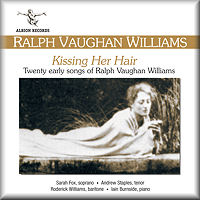 Ralph
VAUGHAN WILLIAMS (1872-1958)
Ralph
VAUGHAN WILLIAMS (1872-1958)
Kissing Her Hair - Twenty early songs by Ralph
Vaughan Williams
To daffodils (baritone); Rondel (baritone); How can the tree
but wither (baritone); Claribel (tenor); Linden Lea (baritone);
Blackmwore By The Stour (baritone); Boy Johnny (baritone); If
I were a Queen (soprano and tenor); Tears idle tears (baritone);
Orpheus with his lute (soprano); When I am dead my dearest (soprano);
The Winters Willow (baritone); Chanson de Quete (baritone);
Ballade de Jesus Christ (baritone); The Splendour Falls (baritone);
Dreamland (soprano); The Sky above the roof (baritone); Nocturne
(baritone); A Clear Midnight (baritone); Joy - Shipmate - Joy!
(baritone)
 Roderick
Williams (baritone) Sarah Fox (soprano) Andrew Staples (tenor)
Iain Burnside (piano)
Roderick
Williams (baritone) Sarah Fox (soprano) Andrew Staples (tenor)
Iain Burnside (piano)
rec. Potton Hall, Westleton, Suffolk, 18-20 March 2007, 2-3
May 2007; Henry Wood Hall, 11 May 2007. DDD
 ALBION
ALBCD002 [59:24]
ALBION
ALBCD002 [59:24] 
AmazonUK
AmazonUS
The same musicians, sessions and engineering team for The
Sky Shall be our roof also produced the second CD of twenty
of RVW's early songs. These date from between 1895 and 1925
although most of the songs here are from the 1900s. His first
marriage was to Adeline Fisher whose Pre-Raphaelite looks were
fey and frail before illness cruelly transformed her. The
Clock of the Years was not kind. The Rondel - Kissing
her hair - the second song - may well be a reminiscence
of their first rapture. Linden Lea is the first song
here to be at all familiar. Roderick Williams essays a pleasing
rustic accent but I am not sure how ‘Dorset’ it
is. From the same year (1901-2) comes another Dorset-Barnes
setting in Blackmwore by the Stour. It has a folksong
rum-ti-tum flavour. Then there’s a sweet sighing lilt
to Orpheus and a nice bounce to the soprano-tenor duet
If I were a queen/king. Tears idle Tears from
1903 has a new darkness and gravity about it. Orpheus with
his Lute is sweetly rounded and trimmed - a beautiful piece.
It does not efface memories of Gurney's later setting but deserves
recognition for its fine and touching invention. It is superbly
done by Sarah Fox. The winter's willow is the third of
the three Barnes' settings here. One notes a pleasing lilting
pattern across the Barnes songs. The two French songs are pleasant
effusions even if the French accent is not all it might be -
the word Joli, for example. The splendour falls is
the last of the Tennyson settings of which there are three here.
One cannot hear these words without thinking of Britten's much
later setting. However this resounding stentorian baritone song
complete with dynamically clever echoing dialogue is good .
A real discovery is Dreamland to words by Christina Rossetti.
This is the epitome of a song finding a time-stilling heart.
Mabel Dearmer's translation of Verlaine provides RVW with another
golden opportunity. This is fully exploited to convey the heat
of high afternoon through the affecting ‘fall’ of
RVW's lyrical essence. Rossetti, Tennyson, Barnes, Shakespeare
- all are represented but perhaps second only to Shakespeare
Whitman went straight to his heart. This is heard in full mastery
in the three Whitman poems especially in the swaying, almost
expressionist Nocturne with its whispers of heavenly
death. The words are challenging to set too. A Clear Midnight
appealed to the composer’s sense of eternity and the
visionary. Some tatters of Stanford however blow through the
pages of Joy Shipmate Joy. This disc includes the world
premiere recording of Rondel. Like the first disc it
was released to mark the 50th anniversary of the death of the
composer in 2008.
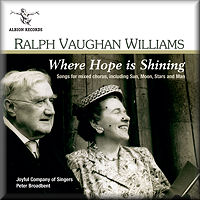 Ralph
VAUGHAN WILLIAMS (1872-1958)
Ralph
VAUGHAN WILLIAMS (1872-1958)
Where Hope Is Shining - songs for mixed chorus
by Ralph Vaughan Williams
No longer mourn for me (Sonnet 71); Echo's Lament for Narcissus;
Three Elizabethan Part Songs: Sweet Day; Three Elizabethan Part
Songs: Willow Song; Three Elizabethan Part Songs: O Mistress
Mine; Come away Death; Linden Lea (arranged by Arthur Somervell);
Ring out your bells; Rest; Fain would I change that note; Alister
McAlpine's Lament; The Winter is Gone; Mannin Veen (Dear Mona);
Our love goes out to English skies; Loch Lomond; The Mermaid;
A Farmer's Son so Sweet; The Turtle Dove; The New Commonwealth;
Sun, Moon, Stars and Man - A cycle of Four Songs: Horses of
the Sun, The Rising of the Moon, The Procession of the Stars,
The Song of the Sons of Light
 Ørjan
Hartveit (baritone); Alistair Young (piano)
Ørjan
Hartveit (baritone); Alistair Young (piano)
Joyful Company of Singers/Peter Broadbent
rec. St Paul’s Church, New Southgate, London N11, 29-30
March 2008.
 ALBION
ALBCD006 [62:18]
ALBION
ALBCD006 [62:18] 
AmazonUK
AmazonUS
The third disc moves away from voice and piano to choir. This
selection spans a life-time of creativity. Much of it is threaded
through and borne up by the human voice for which RVW had a
lifelong enduring love. One can hear in Echo's Lament his
delight in the passionate invention of Thomas Tallis and of
Spem in alium in particular. The three Elizabethan
Part Songs are drawn from much the same vintage as the early
songs on the Kissing Her Hair CD. They are things of
cool lunar delight - no overt heat of passion here. Dowland
and Campion are the models though not slavishly followed. Come
away death is in much the same mood and style pattern. Linden
Lea we already know from the early songs disc. Here the
dialect side is softened by the choir. Quietude is cast aside
by the 1902 setting of Ring Out your bells a setting
of words by Sir Philip Sidney though it too regularly curves
down into quiet. Carillon effects abound. Rest is another
Christina Rossetti setting. By the way, Rossetti almost certainly
came to the composer's attention through his acquaintance with
William Morris, he of Kelmscott fame. Fain would I change
that note dates from the year he worked with Ravel, 1907.
Its melodic material has something in common with his Elizabethan
pieces as well as Linden Lea. The uncomplicated Alister
McAlpine's Lament is sweetly done as is Loch Lomond with
its use of solo voice echoing that of Grainger in A Londonderry
Air and Delius’s Brigg Fair. The 1912 English
ploughboy setting of The winter is gone is for tenors
and baritones alone. In Mannin Veen we think naturally
of Haydn Wood but Vaughan Williams uses the slow-swinging traditional
Manx melody to smoothly idiomatic and touchingly reserved effect.
Our love goes out to English skies is a hearty hymnal-style
song written just after his return from traumatic active service
in the Great War. The Mermaid has a jocular robust tone
(with piano) and the main song is taken by baritone with the
choir joining for the cheering chorus. The Turtle Dove stands
high in this company with its Delian tone. Like Brigg Fair
it is a sheer masterpiece with its endlessly inventive use
of solo voice and choir in so many permutations. This setting
for mixed voices and baritone solo is from 1924. The superb
New Commonwealth is of similar exalted achievement. It
is a choral version of the prelude to the film The 49th
Parallel. The words are by his collaborator - I had not
realised over how many years - Harold Child (1869-1945). CHild
had written the libretto for Hugh The Drover. It is a
remarkably moving piece. Do not miss this. We end with Sun
Moon Stars and Man, a cycle of four songs to words by Ursula
Vaughan Williams from 1955. It starts a bit abruptly after the
end of New Commonwealth. This is the version for mixed
voices with piano. Here, playing the piano, is Alistair Young.
The galloping and confident Horses of the Sun is borne
along by the sort of kinetic power unleashed in the 1931 Piano
Concerto but also hinted at in the sanguine exuberance of the
Five Mystical Songs. The Rising of the Moon is
the second song and is of a cooler calorific radiance - almost
Holstian in its slight chill. The Procession of the Stars
recalls the icy chiming of the glacier and the penguin music
in Scott of the Antarctic but also seems to predict the
language of William Mathias in This Worldes Joie. The
final Song of the Sons of Light has an overwhelming
and sanguine swing. This joint cantata was commissioned by the
Schools Music Association. It was premiered by Boult conducting
1150 voices from the SMA and full orchestra on 6 May 1951. These
final four songs are taken from the choral-orchestral The
Sons of Light (review
review
review
review).
By the way am I the only one to hanker after a reissue of Swingle
II's RCA LP (RL25112) of English and French songs. It included
an ineffably beautiful Bluebird and a wonderfully memorable
set of RVW's Three Shakespeare Songs. OK so the balance
was rather ‘pop’ but the impact was indelible. If
it has been reissued I do not recall seeing it. I am sorry no
longer to have access to that light-filled sequence of singing.
I note that the present disc jumps from ALB 001 and 002 to ALB
006. I wonder what else awaits or is intended from ALB 003-005
and 007-008.
Albion's discs are invariably well documented by Stephen Connock
OBE. Little blemishes such as referring to Ethel Smyth as Smythe
are regrettable but not common. The rather too small type
for the booklet of 001 has gone by the time we reach 002 - not
to return.
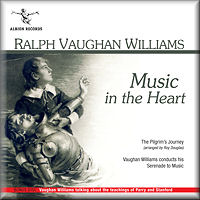 Ralph
VAUGHAN WILLIAMS (1872-1958)
Ralph
VAUGHAN WILLIAMS (1872-1958)
Music In The Heart - A commemorative Album marking the
50th anniversary of the death of Ralph Vaughan Williams on 26th
August 1958.
CD 1 Serenade to Music (1938)
Liverpool Philharmonic Orchestra/Ralph Vaughan Williams
rec. live, Royal Concert, 22 November 1951, Royal Festival Hall,
London
The Pilgrim's Journey (arr. Christopher Morris and Roy
Douglas): 1. Cast thy burden upon the Lord (tenor and baritone);
2. Into thy hands, O Lord (baritone); 3. Who would true valour
see (soprano and baritone); 4. Unto him that overcometh (women’s
chorus); 5. Vanity Fair (tenor and baritone); 6. He that is
down (soprano); 7. The Lord in my Shepherd (chorus only); 8.
Alleluia (soprano, tenor and baritone)
 Louis
Bové (soprano), Clifford Scott (tenor), John Peck (baritone),
Arnold Ostlund Jr. (organ); Plymouth Choir/Henry Pfohl
Louis
Bové (soprano), Clifford Scott (tenor), John Peck (baritone),
Arnold Ostlund Jr. (organ); Plymouth Choir/Henry Pfohl
rec. live, Plymouth Church of the Pilgrims, Sunday 4 April 1965
CD 2
The Teachings of Stanford and Parry - A talk by RVW (edited
from broadcast 17 November 1955)
Excerpt from the Funeral Service of Ralph Vaughan Williams (Westminster
Abbey, Friday 19 September 1958 at 11.30am)
 ALBION
ALBCD009 [53:56 + 29:30]
ALBION
ALBCD009 [53:56 + 29:30] 
AmazonUK
AmazonUS
ALBCD009 is a 2 CD set of historic recordings including the
first ever commercial release of The Pilgrim's Journey.
The latter is yet a further manifestation of The Pilgrim's
Progress heard here in its arrangement by the Roy Douglas.
It is a sort of concert scenario laid out for soprano and baritone
soli, mixed choir and organ. It represents an epitome of the
morality itself; RVW did not see it as an opera. Before we get
to The Pilgrim’s Journey we hear the composer conducting
the 1951 performance of Serenade to Music with the Liverpool
Philharmonic on the South Bank rather than in any of the Liverpool
venues. What we hear is from the Royal Concert at the then very
new and futuristic RFH.
The soloists include many who were the named soloists in Henry
Wood's 1938 premiere: sopranos: Stiles Allen; Isobel Baillie;
Ena Mitchell; Elsie Suddaby; Altos: Muriel Brunskill; Astra
Desmond; Mary Jarred; Gladys Ripley; Tenors: William Herbert;
Richard Lewis; Stephen Manton; Heddle Nash; bass-baritones:
Norman Allin; Robert Easton; Roy Henderson; Harold Williams.
Among this roll-call of honour among the soprano Ena Mitchell
had not sung at the original and only Gladys Ripley among the
altos. By contrast only Heddle Nash among the tenors had sung
in that first Wood line-up. All the original bass-baritones
were still there. This recording bears in upon the listener
what a sensual piece this is. At times one thinks of Flos
Campi. It is certainly one of the master's greatest works
and makes a fascinating play against the classic Wood recording.
The sound is sometimes a little congested but it is very listenable
if you have any extensive experience of archive recordings.
As ever the mind reconstructs the sound and sweep. The violin's
sweet consort to the choir at the end puts one in touch with
a special vernal ecstasy and the soprano ascendant on the words
‘sweet harmony’ rounds this piece out not with a
sleep but a satiated sigh.
After too short a pause we start in a roaring blaze of organ
tone a 1965 recording of the rarely encountered The Pilgrim's
Journey. The latter is a version of ‘The Morality’.
The work is in eight movements devised by Christopher Morris
and Roy Douglas. It parallels the concert versions of Sir
John in Love (In Windsor Forest recorded on EMI by
Reginald Jacques and Norman Del Mar) and Hugh the Drover
(Maurice Jacobson's 1951 A Cotswold Romance - recorded
on Chandos).
The organ gives this piece a notably churchy feel but it’s
also available in a version with orchestra. In any event this
is an invigorating performance - listen to the outgoing Who
Would True Valour See. The Vanity Fair movement has
some vigorously grating writing for the organ and conveys the
wailing worldliness of The Fair. After the materialism of Vanity
Fair the reeds and pipes of the organ and the solo soprano provide
spring water epiphany in He That is Down. There is however
a congestion in this 1965 recording which I take to be mono
but set that against the concentration of fervour. The final
alleluia features the solo voices of soprano, tenor and baritone
against the intertwining exalted weightiness of the full choir.
This music and performance are truly reflective of the authentic
RVW spirit - that intensity of delight once described as ‘notable
ecstasy’.
The shorter bonus disc has a half hour talk by RVW on Parry
and Stanford. It is edited from a broadcast on 17 November 1955.
The venerable composer takes his breath with evident care but
delivers his message with forthright directness. Interestingly
he says Parry was misunderstood by Bax and Warlock. He reminds
us that Parry wrote about Strauss and Schoenberg. Parry believed
morally wrong to make a nice sound on the orchestra. Parry as
a composer potentially among the greatest. It's a lucid talk
- obviously to a present audience - who laugh at expected moments
and shuffle from time to time. It would have been nice if the
talk had been separately tracked to allow moving across its
breadth of subject matter. Westminster Abbey 19 September 1958
with hushed voice of Dimbleby père can that be Come
Down O Love Divine.
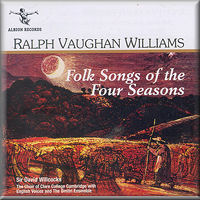 Ralph
VAUGHAN WILLIAMS (1872-1958)
Ralph
VAUGHAN WILLIAMS (1872-1958)
Folk Songs of the Four Seasons: Prologue.
Spring: Early in the Spring (for three voices
unaccompanied); The Lark in the Morning (for two voices); May
Song - Full chorus with semi-chorus. Summer: Summer
is a-coming in and The Cuckoo - Full chorus; The Sprig of Thyme
- Full chorus; The Sheep Shearing - (for two voices unaccompanied);
The Green Meadow (unison - all voices); Autumn:
John Barleycorn (full chorus with semi-chorus); The Unquiet
Grave (for three voices unaccompanied); An Acre of Land (unison
- all voices); Winter: Children's Christmas Song
(in two-part harmony); Wassail Song (unison with descant); In
Bethlehem City (for three voices unaccompanied); God Bless the
Master (unison with descant) (world premiere recording)
In Windsor Forest (The Conspiracy - Sigh no more
ladies; Falstaff and the Fairies - Round about in a fair ring-a;
Wedding Chorus - See the Chariot at hand; Epilogue - Whether
men do laugh or weep) (world premiere of this arrangement for
women’s voices by Guthrie Foot)
 Choir
of Clare College, Cambridge; Dmitri Ensemble, Cambridge/Sir
David Willcocks
Choir
of Clare College, Cambridge; Dmitri Ensemble, Cambridge/Sir
David Willcocks
rec. West Road Concert Hall, Cambridge, 9-10 January 2009.
 ALBION
ALBCD010 [55:22]
ALBION
ALBCD010 [55:22] 
AmazonUK
AmazonUS
Of the five Albion discs issued to date the most ambitious and
exciting is this latest. The CD redresses a longstanding lacuna
in the RVW recorded music catalogue. At last we can now hear
the Folksongs of the Four Seasons. This work for women's
voices and orchestra was written for the first singing festival
of the National Federation of Women's Institutes. This was in
1951 - Festival of Britain year when idealism borne of the Second
World War still resounded but with hopes for a new world. The
work makes intelligent and inspired use of the folksongs RVW
had collected in England between 1904 and 1910. This store has
provided the composer him with a deep source from which to replenish
his style and inspiration. This recording is by a venerable
doyen among the British choral traditions: Sir David Willcocks.
It was issued to mark the 90th birthday of Sir David Willcocks
on 30 December 2009. Willcocks and the superbly prepared choir
are joined by one of the country's youngest orchestras: The
Dmitri Ensemble. Be assured, the roster for the ‘Ensemble’
takes it to full orchestra strength. This is not some cut-down
chamber grouping and the listening experience bears this out
very convincingly.
Folksongs of the Four Seasons is an almost completely
unknown work. It is laid out in fifteen movements grouped in
five sections: Prologue, Spring, Summer, Autumn, Winter. It
seems strange to finish on winter although it is largely Christmas
that is celebrated rather than the icy chill of mortality.
The silvery sopranos Early in the Spring. The English
leafy greenery and birdsong of The Lark in the Morning with
its typically woodwindy. May Song has a cheerful Schwanda-like
touch of Jaromir Weinberger about it. The interesting trajectory
of the work next takes us into summer with Summer is a coming
in which is in roundelay form. It’s dynamic and full
of youthful strength and optimism. Inevitably RVW picks up on
an element of bluff Englishry - the sort one encounters in more
famous works such as the English Folk Song Suite. Autumn
brings the cheering full-flight power of John Barleycorn
with brass to the unrepentant fore. The Children's Christmas
song shows RVW's compassionate humanity when he writes with
touching effect of the poor children at Christmas ‘wandering
in the mire’. Wassail song has the ale-jar clinking
power of the John Barleycorn movement. It would have
appealed to Moeran and Warlock though one can imagine Warlock's
libidinous observations on the songs being set for females -
fewer Tyneside ladettes in those days. In Bethlehem City
is a silvery carol cherishable for any Christmas watch service.
The final section God Bless the Master has that wonderful
sense of journey done, homecoming summation and sky ascendant
victories. RVW writes with light in his pen and light shines
through these cleverly laid out and lovingly performed movements.
It is a pity that there were with the exception of Malcolm Williamson's
The Dark and the Light to be no more such pieces for
the WI annual celebrations. The enlightenment had been snuffed
out as costs and the confusion of cultural excellence with elitism
took hold.
In Windsor Forest is well enough known but not in this
version for orchestra and female only voices. Sigh No more
Ladies is in fact wonderfully light and airily passionate.
exciting. Round about in a fair ring - a gullible and
ever-optimistic Falstaff is deep in the forest surrounded by
rings of faery-seeming folk. There’s a lovely evocation
of sylvan magic here at 1:02. See the chariot at hand -
more music spun from mithril and moonlight. In Whether men
do laugh or weep we hear to great advantage the superb enunciation
and coordinated precision of the choir of Clare College. This
brings to an end a folksy and often irresistible confection.
There is so much in Sir John In Love.
Albion intend further CDs including the complete piano transcriptions
of Job and A London Symphony. They will be well
worth looking out for. I hope that they will also turn their
attention to the shreds and incomplete tatters of the Cello
Concerto and the opera Thomas the Rhymer. It may be a
heretical view in some quarters but I - and I am sure many others
- would welcome a well-informed inventive and style-consistent
realisation of these works.
Rob Barnett












